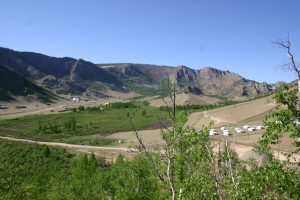Session F-05(60)
Moderator: Wil De Jong
Wednesday, 26 October 2016, 10:30-12:30 (Room 302B)

Terelj National Park, Mongolia. Photo: Alexander Buck, IUFRO Headquarters
Studies presented in this session examined the dynamic interrelationship between forest transition and economic, social and political changes, and discussed the implications for forest policy.
As we entered the Anthropocene, human influence became increasingly stronger causing great forest decline, particularly from 1920 onwards. Direct drivers of forest decrease include, among others, population growth and agricultural expansion.
Forest transition is a phenomenon that suggests that forest cover decline may eventually be followed by a forest cover increase at the global scale. Forest transition has been observed in over 30 countries and it has been a trend in several Asian countries, too. The principal conditions for such forest transition to happen comprise economic growth, governmental forest policies and globalization.
One study suggested that for forest transition to take place, forest policy should incorporate private entrepreneurship in forest management and be aligned with timber trade policy. It also indicated that when investigating the relationship between globalization and forest transition, one should consider the overall situation and the dynamics of each country.
Policy programs with an integrative approach have worked to avoid deforestation and achieve forest transition in several countries. The Republic of Korea, for example, has developed an integrated forest policy program as an innovative system to solve the problems of flood and erosion due to deforestation while pursuing economic growth. This integrative approach helped the reforestation policy to be implemented successfully.
Presentations in this session:
- Reforestation policy integration by the multiple sectors toward forest transition in the Republic of Korea (Mi Sun Park, Department of Environmental Planning, Konkuk University, Korea)
- Economic globalization, trade and forest transition-the case of nine Asian countries (Lingchao Li, Beijing Forestry University & Renmin University of China)
- Changes in peoples livelihood in protected areas in China during a period of rapid tansition Introduction (Weiye Wang, University of British Columbia)
- Effect of Labour Migration on Afforestation: Evidence from China (Wenyuan Liang, Renmin University of China)
- Conditions of Forest Transition in Asian Countries: A Qualitative Comparative Analysis (Yeo-Chang Youn, Seoul National University)
- Comparative study on forest transition pathways of nine countries in the Asia-Pacific region (Jinlong Liu, Renmin University of China)
- Land and forests in the Anthropocene: Trends and outlooks in Asia (Wilhelmus De Jong, Kyoto University)

Leave a Reply